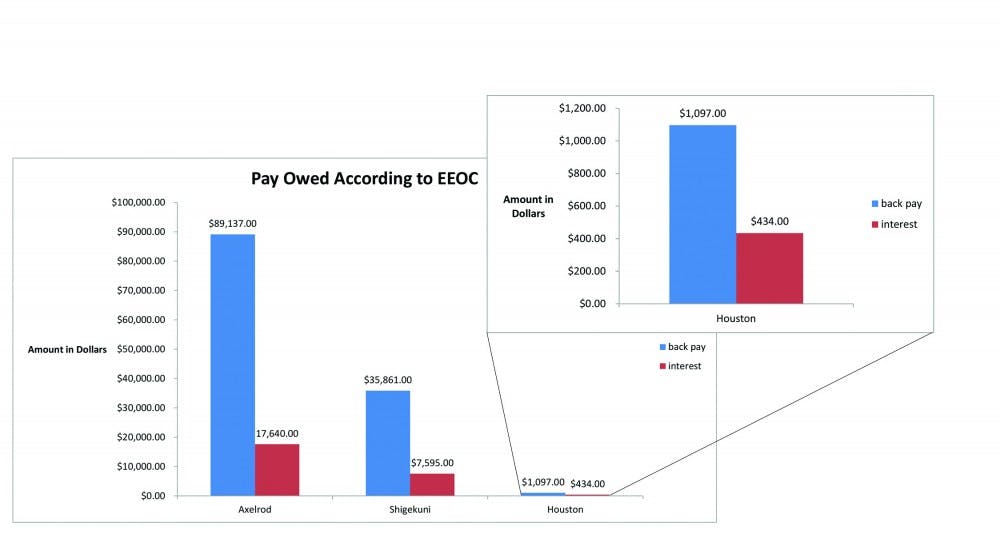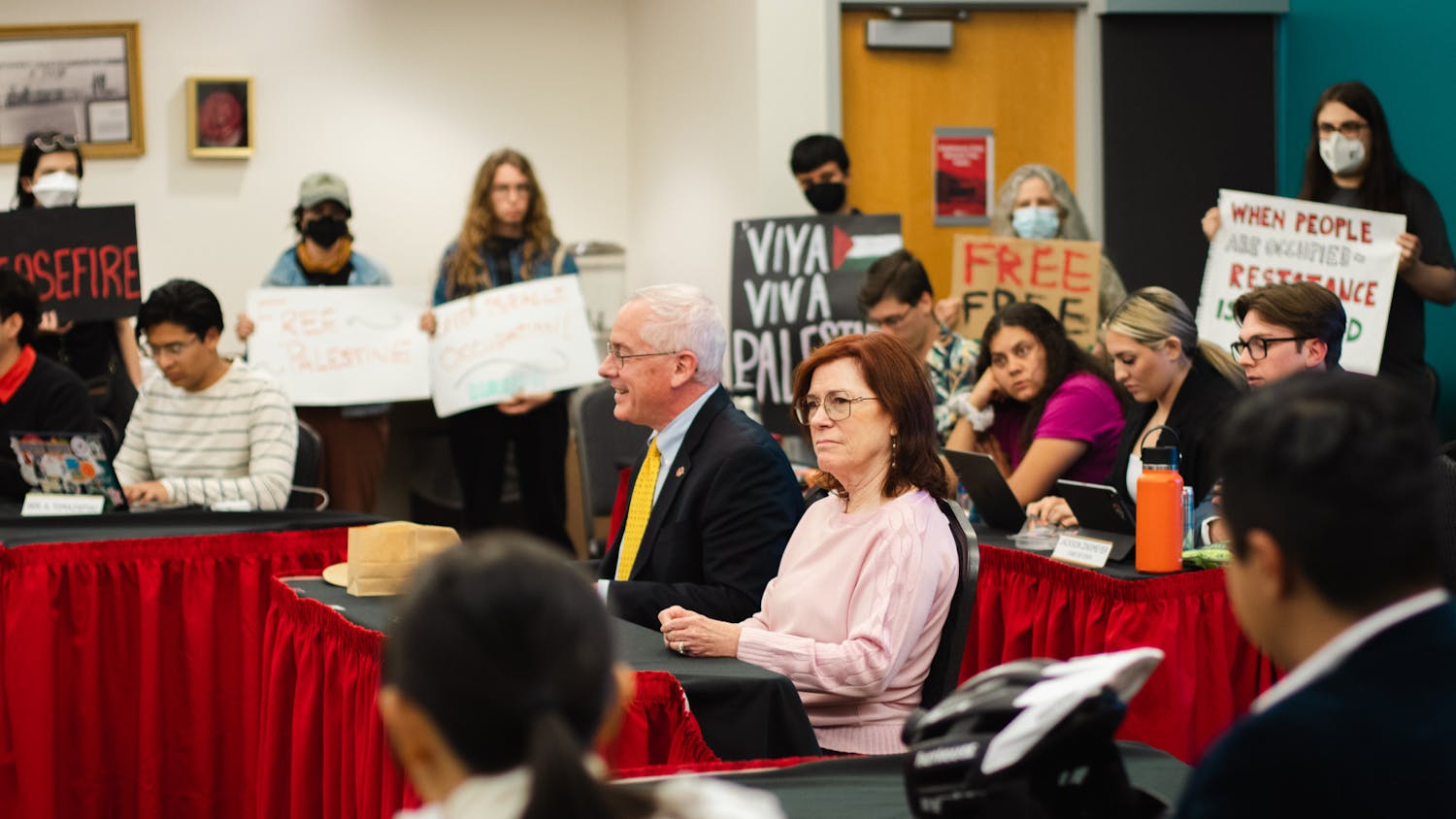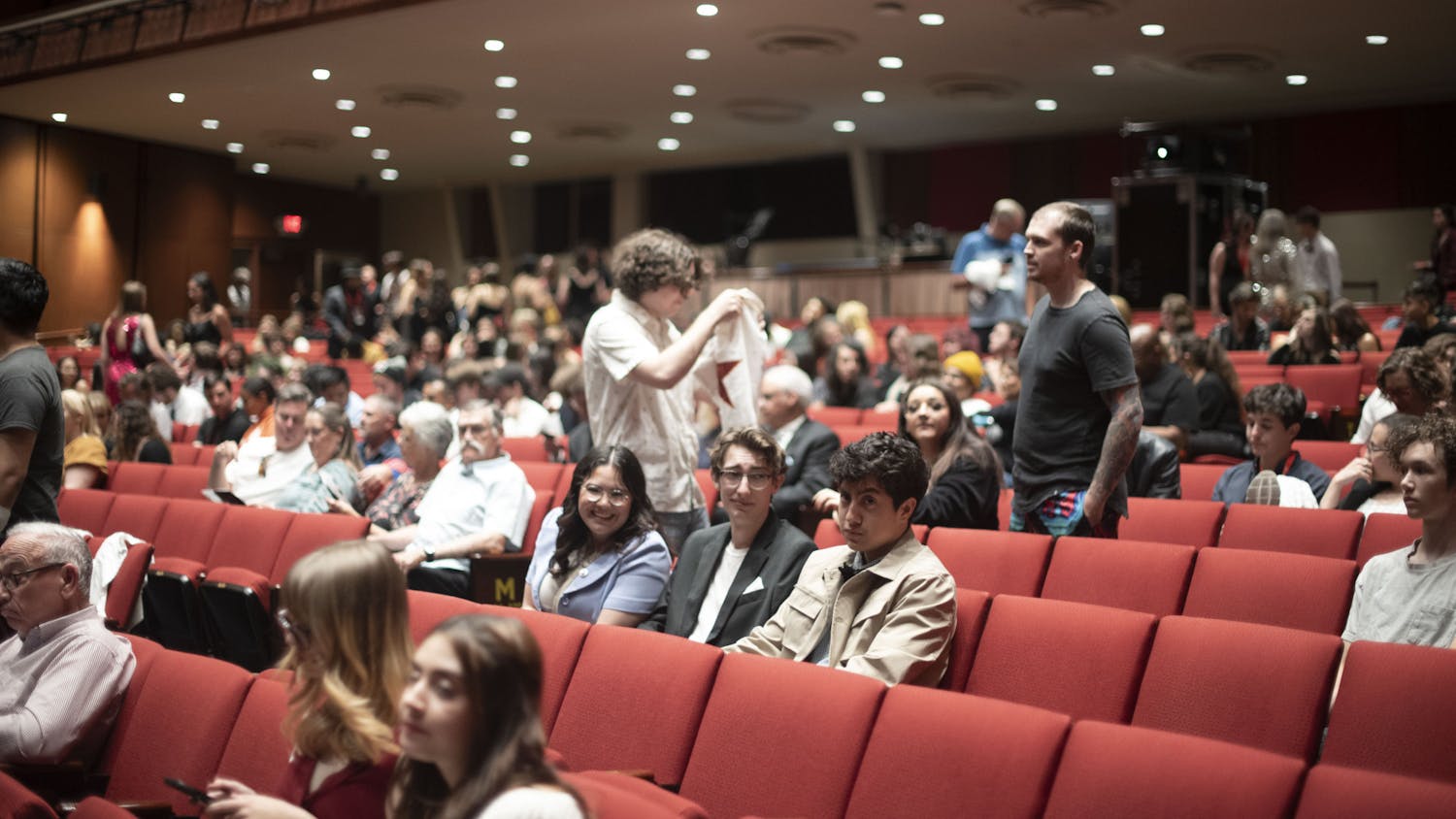The University of New Mexico Board of Regents is being sued by three UNM professors as a result of an investigation done by the Equal Employment Opportunity Commission that revealed UNM female professors in four departments are paid less than their male counter parts.
The professors involved in the suit are tenured professors. Melissa Axelrod, who has been teaching since 1995, and Julie Shigekuni, who has been teaching since 1995, are both in the Linguistics Department, and Gail Houston began teaching English at UNM in 1996.
Axelrod, Shigekuni and Houston decided to file suit after receiving letters from the EEOC on June 27, 2017.
Shigekuni said the three suing were not the only women who received a letter from the EEOC, there were roughly twelve others. The letters stated that UNM was violating the Equal Pay Act 1963 — which prohibits discrimination based on sex in regards to wages when men and women perform under similar conditions in the same workplace — and owed them money.
The letters addressed to each of the professors were also sent to the University and detailed how much money the University owed to them. The amounts are as listed:
- Axelrod — $89,137 in back pay and $17,640 in interest, $106,777 in total.
- Houston — $1,097 in back pay and $434 in interest, $1,531 in total.
- Shigekuni — $35,861 in back pay and $7,595 in interest, $43,456
According to David Plotsky, the lawyer representing the plaintiffs, they have currently filed suit with the United States District Court of New Mexico.
UNM received a determination letter stating that the EEOC initiated an EPA charge against UNM on Aug. 9, 2011. The data from this investigation revealed that UNM was paying female professors in the English, Linguistics, Marketing and Economics departments less than their male counter parts. The EEOC notified UNM about the violation of the EPA in October 2016.
According to the EEOC determination letter, “the investigation revealed that UNM failed to provide persuasive evidence that factors other than sex accounted for the disparity in pay… respondent failed to articulate a non-discriminatory explanation for the pay disparity that withstood scrutiny.”
Axelrod said the three filed suit at the end of the Spring 2018 semester after trying to exhaust administrative solutions.
Before beginning the litigation process, Shigekuni said the three filed a complaint with Mark Peceny, the dean of the College of Arts and Sciences, the UNM administration and requested a meeting with President Garnett Stokes.
Shigekuni said she also filed a report with the UNM Office of Equal Opportunity, adding that none of the attempts resulted in any change.
Get content from The Daily Lobo delivered to your inbox
Stokes was not in office when the initial letter was sent. Once she took office a meeting was requested and a letter with all of the professors' names was sent, including the ones who aren’t suing. The letters did not receive a reply.
Axelrod said she plans on retiring from UNM at the end of the summer and if she wasn’t she would be worried about being fired because she spoke up about the discrimination and inequality at UNM. Houston said there are both subtle ways and unsubtle ways that UNM could retaliate against the professors’ willingness to speak out.
“I think (the) fact that only three of us signed on for the lawyer is because the other professors do not want to lose their jobs,” Axelrod said.
According to Plotsky, a court date is not set because a judge has to first decide if the case is admissible. In a defendant's memorandum brief filed on May 25, 2018, UNM argues the case is not admissible in court due to the statute of limitations, and the court lacks jurisdiction because the Plaintiffs have not exhausted all administrative remedies with the division (referring to the New Mexico Human Rights Commission, according to Plotsky) or the New Mexico Human Rights Act (NMHRA).
The statute of limitations refers to the time that you have to file a lawsuit after an event occurred or from the date the plaintiff became aware that something happened, Plotsky said. According to the defendant, this time has already passed.
According to the defendant’s memorandum brief “under the NMHRA, plaintiffs must file a notice of appeal within 90 days from the date of service of the right to sue letter. NMSA 28-1-13(A).”.
The plaintiff’s first amended complaint states the New Mexico Human Rights Act allows an ‘aggrieved employee’ to bring legal action six years after the last violation or up to two years after the last date of employment — all three professors are currently employed at UNM.
The subsequent argument listed by the defendant is that the plaintiffs did not file a charge with the EEOC.
According to the plaintiff’s first amended complaint, the administrative action in this litigation was commenced by the EEOC against UNM, and therefore the professors did not need to initiate such action with the NMHRC, citing that the EEOC and NMHRC have equivalent enforcement standards.
In ordinary court proceedings the aggrieved employee does need to file with the EEOC, Plotsky said. He said this is not an ordinary case proceeding because the EEOC initiated the administrative action by notifying UNM of the investigation, then sent UNM a determination letter and then letters to the professors detailing how much UNM owed them.
“In this instance the EEOC provide plaintiffs with the equivalent of a 'right to sue' letter in (Axelrod, Houston and Shigekuni’s) case on June 27, 2018, and informed each of them that they had a two-year statute of limitation, accruing from the date of that letter, to file a private lawsuit under the EPA,” according to the plaintiff’s amended complaint filed on April 17, 2018. It also states the letter satisfies pre-filing requirements under the NMHRA.
Once the court decides if the case is admissible, the other arguments and evidence will be evaluated by the jury through court proceedings, Plotsky said. The professors will file to have this case be considered a class action case, Plotsky said, in which case the plaintiffs will represent the other women who received letters from the EEOC.
UNM Title IX coordinator Heather Cowan said if the only reason that professors were being paid less was because of their gender then UNM would be directly violating Title IX.
At some universities Title IX only applies to the students, Cowan said, adding that UNM does not fall under this category and professors are also protected.
“Employment at UNM is considered an educational program and activity…UNM is not exempt from federal laws under Title IX,” Cowan said.
Cinnamon Blair, the chief marketing and communications officer for UNM, said that neither she nor Stokes can comment on pending litigation. Jeremiah Ritchie, the lawyer representing UNM, did not respond to the Daily Lobo’s requests for comment.
“Lawyers often do not like their clients to talk. However, there has been no gag order placed and no legal restriction,” Plotsky said.
Megan Holmen is a freelance reporter at the Daily Lobo. She can be contacted by email at news@dailylobo.com or on Twitter @megan_holmen.






